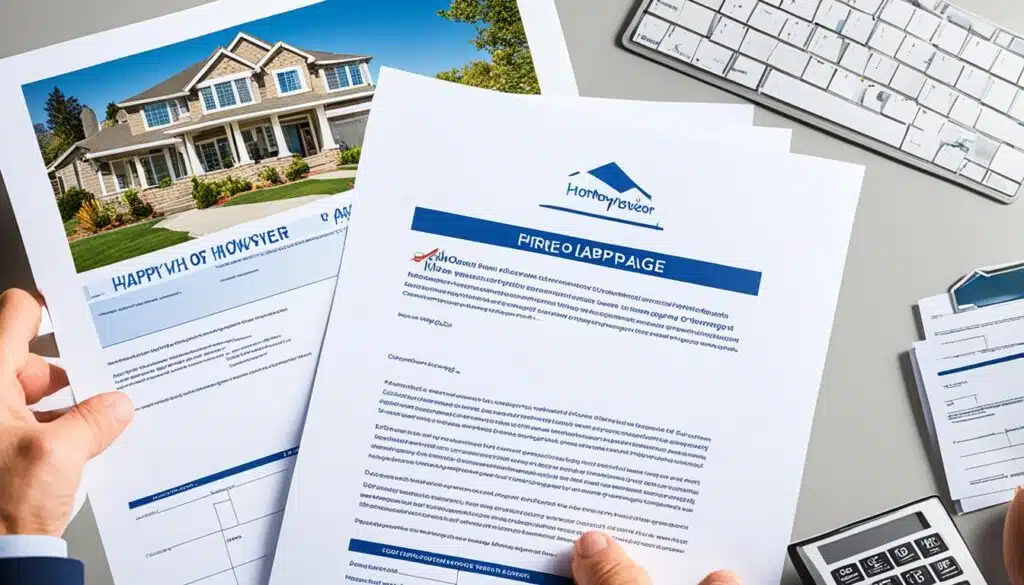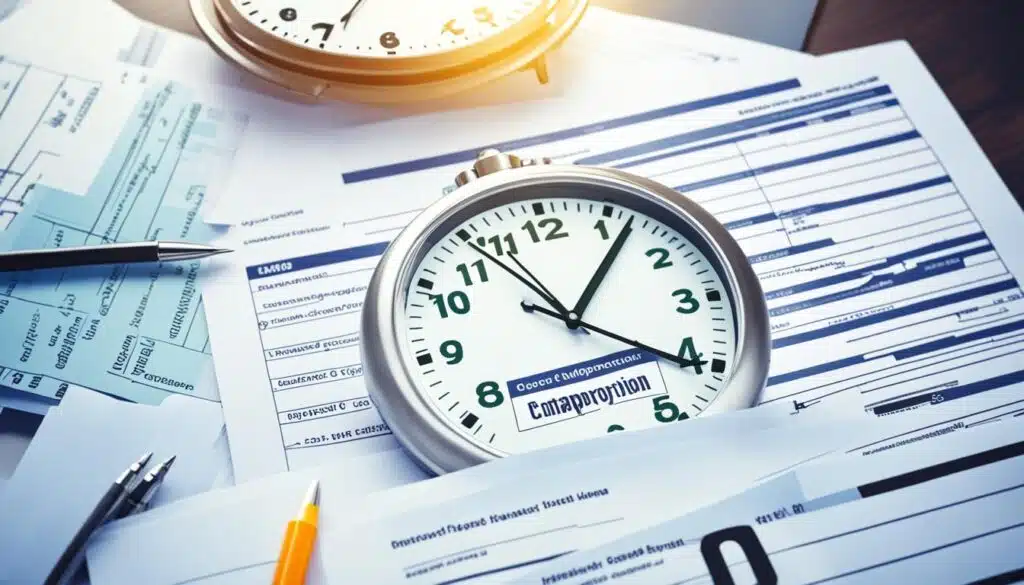If you’re planning to buy a home, it’s essential to understand the concept of loan pre-approval. This process allows you to determine how much money you can borrow and gives sellers confidence in your ability to secure financing. Mortgage pre-approval is a detailed evaluation of your income, assets, and credit score, providing you with a clearer picture of your borrowing power and the interest rate you may receive.
Unlike prequalification, which provides a rough estimate, pre-approval involves a thorough analysis of your financial situation. It requires providing documentation such as tax returns, pay stubs, bank statements, and identification. A lender will review this information and conduct a hard credit check to assess your creditworthiness. Pre-approval not only helps you determine your budget but also enables you to make stronger offers and stand out among other buyers.
Key Takeaways:
- Loan pre-approval is a detailed evaluation of your financial situation to determine the loan amount you could be approved for and the interest rate you may receive.
- Pre-approval involves providing documentation such as tax returns, pay stubs, bank statements, and identification.
- A hard credit check is conducted during the pre-approval process to assess your creditworthiness.
- Pre-approval allows you to shop for homes within your budget and make stronger offers.
- Keep in mind that pre-approval is not a guarantee of loan approval, as additional property details will need to be reviewed.
Understanding the Loan Pre-Approval Process
The loan pre-approval process is a crucial step in securing financing for your home purchase. It involves gathering and verifying your financial information to determine your loan eligibility and borrowing capacity. By understanding the loan pre-approval process, you can prepare yourself ahead of time, making your home search smoother and more efficient.
Loan Application Process
To begin the loan pre-approval process, you will need to fill out a loan application. This typically includes providing details such as your income, employment history, assets, and credit history. It is important to be honest and accurate when providing this information, as any discrepancies may impact your loan eligibility.
| Loan Application Process | Loan Approval Criteria | Loan Eligibility Requirements |
|---|---|---|
| Complete loan application with accurate information | Proof of stable income and employment history | Good credit score and history |
| Provide supporting documentation | Adequate assets and down payment | Debt-to-income ratio within acceptable limits |
| Undergo a credit check | Meeting the lender’s specific loan program criteria | Other lender-specific requirements |
Loan Approval Criteria
During the loan pre-approval process, the lender will evaluate various factors to determine whether you meet their loan approval criteria. These criteria typically include:
- Proof of stable income and employment history
- A good credit score and credit history
- Adequate assets and down payment
- A debt-to-income ratio within acceptable limits
- Meeting the specific loan program criteria set by the lender
- Other lender-specific requirements
Meeting these criteria is essential in obtaining loan pre-approval, so ensure that you have the necessary documentation and qualifications before starting the application process. This will increase your chances of getting approved for a loan.
Loan Eligibility Requirements
In addition to meeting the loan approval criteria, there are certain loan eligibility requirements that you must fulfill. These requirements may vary depending on the lender and the type of loan you are applying for. Some common eligibility requirements include:
- Proof of identity and residency
- Minimum credit score
- Specific income thresholds
- Debt-to-income ratio limits
It is important to familiarize yourself with these requirements and ensure that you meet them before applying for loan pre-approval.
“The loan pre-approval process involves gathering and verifying your financial information to determine your borrowing capacity and assess your creditworthiness.”
By understanding the loan pre-approval process, you can navigate through it smoothly and increase your chances of getting approved for a loan. Take the time to gather all necessary documentation and ensure that you meet the loan eligibility requirements. This will not only speed up the pre-approval process but also show sellers that you are a qualified buyer when you start your home search.
The Benefits of Loan Pre-Approval
Obtaining a loan pre-approval comes with several benefits that can enhance your home-buying experience. Let’s take a closer look at the advantages of getting pre-approved for a loan:
- Shop within your budget: Loan pre-approval allows you to determine your borrowing capacity and set a realistic budget for your home search. By knowing the loan amount you are qualified for, you can focus on properties that align with your financial capabilities, making the house-hunting process more efficient.
- Gain a competitive edge: Real estate agents often require pre-approval before showing you properties. Having a pre-approval letter in hand shows sellers and agents that you are a serious buyer who has already secured financing. This can give you a stronger position when making an offer and increases the likelihood of your offer being accepted.
- Negotiate better terms: With a pre-approval letter, you have more leverage during negotiations. Sellers may be more willing to negotiate on price or other terms when they see that you already have loan approval. This can potentially save you money or help you secure more favorable terms.
- Identify financial issues: During the pre-approval process, lenders thoroughly assess your financial profile, including your income, assets, and credit history. This evaluation can help you identify any potential issues that may impact your loan application. Addressing these issues beforehand can improve your chances of securing a loan offer.
“Loan pre-approval provides you with a clear understanding of your borrowing capacity, increases your competitiveness as a buyer, and empowers you to navigate the home-buying process with confidence.”
With these benefits in mind, it’s clear that obtaining a loan pre-approval is a valuable step to take before embarking on your home-buying journey.
Loan Pre-Approval Checklist:
| Documents | Actions |
|---|---|
| Proof of income (pay stubs, tax returns) | Gather and organize recent pay stubs and tax returns to demonstrate your income stability. |
| Bank statements | Collect several months’ worth of bank statements to verify your savings and financial stability. |
| Identification (driver’s license, passport) | Ensure you have valid identification documents readily available. |
| Credit history | Review your credit report for any errors or issues that may affect your eligibility. Take steps to improve your credit score if necessary. |
| Employment history | Compile a record of your employment history, including previous employers, dates of employment, and job titles. |
By completing this loan pre-approval checklist, you can streamline the pre-approval process and demonstrate your financial readiness to lenders.
How to Get Preapproved for a Mortgage
Obtaining a preapproval for a mortgage is an important step when buying a home. It gives you a clear understanding of your borrowing capacity and helps you determine how much you can afford. To get preapproved, you will need to gather and submit the necessary financial documentation and undergo a credit check.
Here are the steps to follow to get preapproved for a mortgage:
- Check your credit: Before applying for a preapproval, it’s a good idea to check your credit report and score. This will give you an idea of where you stand and if there are any issues that need to be addressed.
- Gather financial documentation: Lenders require a variety of financial documents to assess your financial stability. These may include:
| Financial Documentation | Description |
|---|---|
| Proof of income | Documents such as pay stubs, W-2 forms, and tax returns that show your income. |
| Employment history | A record of your employment history, including the name and contact information of your employer. |
| Asset information | Details of your assets, such as bank statements, investment accounts, and information about any properties you own. |
| Identification | Valid identification, such as a driver’s license or passport. |
- Authorize a credit check: Lenders will require a hard credit check to assess your creditworthiness. This check will give them an idea of your credit score, payment history, and outstanding debts.
- Submit your application: Once you have gathered all the necessary documentation and authorized the credit check, you can submit your application to the lender. Make sure you provide accurate and complete information to avoid delays.
- Review and preapproval letter: After receiving your application, the lender will review your financial information and assess your eligibility for a mortgage. If approved, they will issue a preapproval letter that outlines the loan amount you are qualified for.
It is important to note that a preapproval is not a guarantee of final loan approval. Additional property details, such as an appraisal and title search, will need to be reviewed by the lender before the loan can be finalized.
Remember, getting preapproved for a mortgage puts you in a stronger position as a buyer and helps streamline the homebuying process. It allows you to shop for homes within your budget and shows sellers that you are a serious and qualified buyer. Take the time to gather your financial documentation, check your credit, and undergo the preapproval process to set yourself up for success in your homebuying journey.
Understanding the Difference Between Pre-Approval and Prequalification
When it comes to loan approvals, the terms pre-approval and prequalification are often used interchangeably. However, it is important to understand the key differences between the two.
Prequalification is an initial assessment of your finances based on self-reported information. It provides a rough estimate of your borrowing power without involving a hard credit check. During the prequalification process, you provide details about your income, assets, and debts to the lender, who uses this information to give you an idea of the loan amount you may qualify for and the potential interest rate.
Keep in mind that prequalification is not a guarantee of loan approval. The figures provided are based on the information you provide and may change once the lender conducts a thorough review and obtains more details about your financial situation.
Pre-approval, on the other hand, is a more comprehensive process. It involves the lender verifying your financial information and conducting a hard credit check. During pre-approval, you will need to submit documentation such as pay stubs, tax returns, bank statements, and identification. The lender uses this information to assess your creditworthiness and provide a more accurate assessment of your borrowing capacity.
Unlike prequalification, pre-approval is a stronger indication of your eligibility for a loan. It shows that the lender has reviewed your financial information and conducted a thorough assessment, making it a more reliable indicator of your borrowing power.
In summary, prequalification provides rough estimates based on self-reported information, while pre-approval involves a thorough review and verification of your financial details. Pre-approval offers a more accurate assessment of your borrowing capacity and creditworthiness.
The Importance of a Pre-Approval Letter
A pre-approval letter is an essential tool when house hunting. Real estate agents often require a pre-approval letter before showing you properties, as it confirms that you have already been approved for a loan and have the financial means to make an offer.
Including a pre-approval letter with your offer shows sellers that you are a serious buyer and increases the likelihood of your offer being accepted. A pre-approval letter provides sellers with confidence that you can obtain financing and are ready to move forward with the home purchase.
By submitting a pre-approval letter, you demonstrate your credibility and distinguish yourself from other potential buyers who may not have taken the extra step to secure pre-approval. This can give you a significant advantage, especially in competitive real estate markets where sellers are looking for strong offers.
Additionally, a pre-approval letter gives you a clear understanding of your budget and helps you focus your search on homes that are within your financial means. This saves you time and effort by avoiding properties that are outside your price range.
When it comes to negotiating with sellers, having a pre-approval letter puts you in a stronger position. Sellers are more likely to consider your offer seriously because they know you have already gone through the necessary steps to secure financing. This can give you an edge when competing against buyers who have not yet obtained pre-approval.
Key Takeaways:
- A pre-approval letter shows sellers that you are a serious buyer and have been approved for a loan.
- Including a pre-approval letter with your offer can increase the likelihood of your offer being accepted.
- Having a pre-approval letter gives you a competitive advantage in the real estate market.
- A pre-approval letter helps you determine your budget and focus your search on homes within your price range.
- Sellers are more likely to take your offer seriously if you have a pre-approval letter.
Factors Affecting Loan Approval
While pre-approval gives you an idea of your borrowing power, the final loan approval is contingent upon several factors related to the property being purchased. These factors include the appraisal value of the home, as the lender wants to ensure you are not overpaying for the property. The lender will also conduct a title search to confirm ownership and check for any claims or liens. Additionally, the condition of the home may impact loan approval, particularly for certain types of loans such as FHA loans that have specific property standards. Issues such as a damaged roof or structural deficiencies may need to be addressed before the loan can close.
Property Appraisal
The appraisal value of the property is an important consideration for loan approval. Lenders want to ensure that the property is worth the loan amount and that you are not overpaying. A licensed appraiser will assess the property’s condition, location, and comparable sales to determine its market value. If the appraisal value is lower than the purchase price, you may need to negotiate with the seller or reconsider your offer.
Title Search
A title search is conducted to confirm ownership of the property and check for any claims or liens that may affect its marketability. The lender wants to ensure that the property has a clear title and that there are no legal issues that could impact your ability to obtain financing. This search is typically performed by a title company or attorney who will issue a title insurance policy to protect against any undiscovered issues.
Home Condition
The condition of the home is also important for loan approval, especially for certain types of loans such as FHA loans that have specific property standards. The lender wants to ensure that the property is safe, habitable, and meets certain minimum requirements. Issues such as a damaged roof, plumbing or electrical problems, or structural deficiencies may need to be addressed before the loan can close.
How Long Does Pre-Approval Last?
When obtaining a loan pre-approval, it’s essential to be aware of the pre-approval expiration date. Pre-approval letters typically stay valid for a period of 60 to 90 days, varying based on the lender’s policies.
After the specified expiration date, you may need to go through the pre-approval process again if you haven’t yet found a property. It’s crucial to keep track of the expiration date and plan accordingly to avoid any delays in your home-buying journey.
Understanding the Loan Approval Process
It’s important to note that the pre-approval expiration date does not directly impact the loan approval process itself. Once you’ve found a property and are ready to proceed with the purchase, the lender will conduct a thorough review of the property details.
This evaluation aims to ensure that the property meets the necessary criteria for loan approval, including factors such as its appraisal value, title search results, and overall condition. The lender will assess these aspects to determine the property’s suitability for financing.
How Pre-Approval Affects Your Credit Score
When you apply for pre-approval, the lender will conduct a hard credit check as part of the process. This means that a record of the credit check will be added to your credit report, and it may cause a temporary decrease in your credit score. However, the impact on your credit score is usually minimal and short-lived.
It’s important to note that the temporary decrease in your credit score from a hard credit check will not significantly affect your creditworthiness or your ability to secure a loan. Lenders understand that borrowers may need to compare loan offers and shop around, so they take this into consideration when evaluating your creditworthiness.
If you apply for pre-approval with multiple mortgage lenders within a short timeframe, typically within 30 days, the subsequent credit inquiries will not have a further negative impact on your credit score. This allows you to compare loan offers and find the best mortgage terms without worrying about multiple credit checks damaging your credit.
However, it’s still important to be mindful of unnecessary credit inquiries. Each time your credit report is checked, it leaves a footprint, and excessive inquiries may raise concerns for lenders. It’s always a good idea to review your credit history and address any inaccuracies or issues before applying for pre-approval to ensure that your credit report accurately reflects your financial situation.
Table: How Pre-Approval Affects Your Credit Score
| Impact | Description |
|---|---|
| Temporary Decrease | A hard credit check during pre-approval may cause a temporary decrease in your credit score. |
| Minimal Impact | The impact on your credit score is usually minimal and will not significantly affect your creditworthiness. |
| Multiple Credit Inquiries | Subsequent credit inquiries from mortgage lenders within a short timeframe will not have a further negative impact on your credit score. |
| Mindful Approach | It’s important to limit unnecessary credit inquiries and review your credit history for any inaccuracies or issues before applying for pre-approval. |
Conclusion
Obtaining a loan pre-approval is an essential step in the home-buying process. It provides valuable insights into your borrowing capacity, allowing you to shop for homes that align with your budget and increase your chances of having your offer accepted. Unlike prequalification, pre-approval involves a more thorough assessment, which includes the submission of financial documentation and a hard credit check.
It’s important to understand that pre-approval is not a guarantee of loan approval. Additional property details, such as the home appraisal and title search, will need to be reviewed by the lender before finalizing the loan. Pre-approval letters usually come with an expiration date, so you need to keep track of this date if you haven’t found a suitable property within the given timeframe.
One thing to keep in mind is that pre-approval may have a temporary impact on your credit score. However, this effect is usually minimal and should not significantly hinder your creditworthiness. Prioritize limiting unnecessary credit inquiries and ensuring the accuracy of your credit history before applying for pre-approval.
Also Refer : 8 Steps To Help You Pay Off Student Loans Fast
FAQs
Q: What is loan pre-approval?
A: Loan pre-approval is a process where a lender reviews your financial information to determine if you are eligible for a loan and the amount you can borrow.
Q: How does loan pre-approval differ from pre-qualification?
A: While pre-qualification gives you an estimate of what you may be able to borrow, pre-approval involves a more thorough review of your financial situation, giving you a more accurate picture of your borrowing capabilities.
Q: Will getting a loan pre-approval hurt my credit score?
A: Typically, the credit inquiry associated with a loan pre-approval may cause a temporary decrease in your credit score, but the impact is usually minimal and short-lived.
Q: What are the benefits of obtaining a mortgage preapproval?
A: With a mortgage preapproval, you can demonstrate to sellers that you are a serious buyer and can make a strong offer on a property you are interested in purchasing.
Q: How can I get prequalified for a personal loan?
A: To get prequalified for a personal loan, you will need to provide your personal and financial information to a lender, who will then evaluate your eligibility for the loan.
Q: What factors determine if I qualify for a loan preapproval?
A: Factors such as your credit score, income, employment history, and debt-to-income ratio will be considered when determining your eligibility for a loan preapproval.
Q: How can I avoid multiple hard credit pulls when seeking loan preapproval?
A: You can minimize the impact on your credit score by shopping for loan pre-approval within a short period, typically 14-45 days, as credit bureaus may treat multiple loan inquiries within this timeframe as a single inquiry.
Q: Can I prequalify for a loan with bad credit?
A: It is possible to prequalify for a loan with bad credit, but keep in mind that your options may be limited, and you may face higher interest rates.
Q: Why is it essential to check my credit score before seeking preapproval for a loan?
A: Checking your credit score beforehand allows you to address any issues that could potentially impact your loan preapproval, such as errors on your credit report or outstanding debts.
Q: What should I consider when evaluating loan terms for pre-approval?
A: When reviewing loan terms for pre-approval, consider factors such as interest rates, loan duration, monthly payments, and any additional fees or charges associated with the loan.











